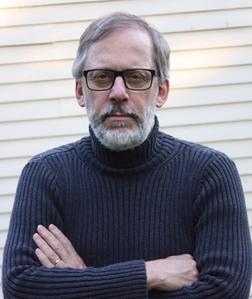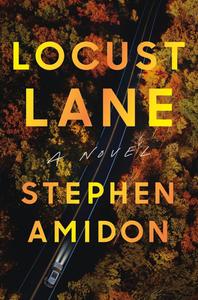
|
|
| photo: Celeste Amidon | |
Stephen Amidon was born in Chicago and grew up on the East Coast. He lived in London for 12 years before returning to the United States in 1999. He now lives in Massachusetts and Torino, Italy. His books have been published in 16 countries and include two works of nonfiction, a collection of stories and seven novels, including Human Capital, adapted as a film directed by Marc Meyers in 2019, and Security, also adapted as a film and released by Netflix in summer 2021. His ninth novel is Locust Lane (Celadon, January 17, 2023), about the search for justice and the fault lines of power and influence in a seemingly idyllic town.
Handsell readers your book in 25 words or less:
A murder in suburbia sets three families on a collision course as they scramble to protect their treasured children from the consequences of the crime.
On your nightstand now:
Down and Out in Paradise: The Life of Anthony Bourdain by Charles Leerhsen. I was always deeply impressed by the broadcasting and writing of Bourdain, who possessed such a humane, wise and unpretentious presence. I'm curious to see how such a seemingly ideal life could have gone so terribly wrong at the end.
Razorblade Tears by S.A. Cosby. I read Blacktop Wasteland last year and was immediately sold on Cosby's brand of hard-bitten Southern noir. More, please.
The Night Shift by Alex Finlay. I'm about halfway through this and think it's terrific. It's only Finlay's second novel, but he writes with immense authority and skill.
Olga Dies Dreaming by Xochitl Gonzalez. I've heard nothing but good things about Olga and plan to see what all the fuss is about.
Favorite book when you were a child:
Johnny Tremain: A Story of Boston in Revolt by Esther Forbes. I must have read Forbes's magnificent 1943 YA novel a half-dozen times as a boy. It was the first time a novel transported me to another era. For 300 pages, I was Johnny. It really fired up my imagination and taught me that a novel should create an empathetic bond between reader and characters.
Your top five authors:
Don DeLillo: He's a novelist with a stethoscope on the chest of our fibrillating world. From Lee Harvey Oswald to the "most photographed barn in America," DeLillo depicts the modern American landscape with shocking precision and a wickedly deadpan style. No one else can make dread so terminally funny.
Jane Austen: I recently had the pleasure of teaching Emma and was struck this time around by Austen's cunning sense of humor, her sly feminism and her astonishing scope in rendering characters. She is the great (and I mean great) grandmother of all novelists.
Ernest Hemingway: Literary fashion comes and goes, but Hemingway's sentences remain as durable as ancient monuments. And the more I read him, the more I appreciate his ear for dialogue.
Pete Dexter: In novels like Paris Trout and Brotherly Love, Dexter wrote about toxic masculinity long before it became a term of art. His stories of inarticulate, violent men fearlessly explore the no-man's-land between savagery and civilization. His prose hits you like cement trucks with blown brakes.
Graham Greene: Greene pulled off one of the most difficult magic acts in literary history: combining the popular storytelling techniques of the thriller and the espionage novel with deeply profound philosophical and religious meditations.
Book you've faked reading:
Moby-Dick. I've tried. Truly. I even gave the audio book a shot. But that great, lumbering beast drowns me every time (and I'm not talking about the whale).
 Book you're an evangelist for:
Book you're an evangelist for:
White Noise by Don DeLillo. I've taught it to students. I've bought it for friends. I've forced it on my family. DeLillo's deliriously dark 1985 novel about an "airborne toxic event" that threatens a loveable midwestern family is an essential guide to the human condition.
Book you've bought for the cover:
Snow Falling on Cedars by David Guterson. The bleak, beautiful, fog-enshrouded cover photo of a Pacific Northwestern landscape promises mystery, tragedy and romance. And the book certainly delivers.
Book you hid from your parents:
Soul on Ice by Eldridge Cleaver. Not a good fit with mom and pop's Nixonian Republican world view but a real eye-opener for a 14-year-old boy at an almost entirely white suburban high school.
Book that changed your life:
The Grapes of Wrath. Another book I read during my 14th year. Even to my callow mind, Steinbeck's ability to switch from the macroscopic view of an America in deep crisis to the precisely rendered fate of the Joad clan was an immense literary achievement.
Favorite line from a book:
"The world breaks every one and afterward many are strong at the broken places. But those that will not break it kills. It kills the very good and the very gentle and the very brave impartially. If you are none of these you can be sure it will kill you too but there will be no special hurry." --Hemingway, A Farewell to Arms
Five books you'll never part with:
The Arden Shakespeare Complete Works. Table of Contents: all human experience.
The Moviegoer by Walker Percy. As a former philosophy major and film critic, I have formed a special bond with Percy's 1961 novel of a New Orleans stockbroker who is obsessed with Hollywood movies and profoundly influenced by the teaching of Kierkegaard.
Revolutionary Road by Richard Yates. I am a child of the suburbs who now writes about them, and Yates's 1962 tragedy of a young couple floundering in conformity and well-being inspires everything I create.
The Bonfire of the Vanities by Tom Wolfe. For its pure energy, vast scope and deadly satire, Wolfe's study of Reagan-era greed remains the gold standard for me in how to write a big novel that never lets its foot off the gas.
Subdivision by Stephen Amidon. My first book, long out of print. I only have a few copies left--and I'm never parting with them.
Book you most want to read again for the first time:
The Silence of the Lambs by Thomas Harris. I had to read the final pages of Harris's 1988 masterpiece with an index card covering upcoming paragraphs to keep me from jumping ahead. A brilliantly written thriller that, for me, was literally thrilling.

